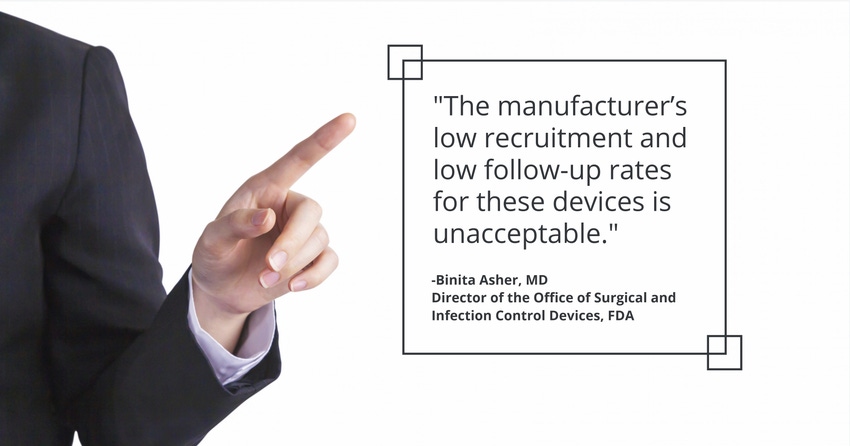Breast Implant Makers Land in Hot Water with FDA
FDA cited Allergan for failure to comply with post-approval study requirements. The agency also cited Ideal Implant for failures relating to quality system and medical device reporting regulations.
May 15, 2020

FDA took action Thursday that proves the agency is still keeping close tabs on the breast implant market, which has long been plagued with safety and regulatory problems.
FDA sent warning letters this week to Allergan and Ideal Implant failure to comply with various regulatory requirements. In Allergan's case, the Irvine, CA-based company has allegedly failed to comply with post-approval study requirements to assess the long-term safety and risks of two models of breast implants, both of which were voluntarily recalled from the market last year. In Ideal Implant's case, the Dallas, TX-based company allegedly failed to comply with current good manufacturing practice requirements and adverse event reporting requirements following an FDA inspection conducted earlier this year.
The warnings letters are similar to those issued last year to Irvine, CA-based Mentor Worldwide, a unit of Johnson & Johnson, and to Santa Barbara, CA-based Sientra for deficiencies in each company's post-approval study for silicone breast implant approvals.
Every manufacturer of FDA-approved silicone gel-filled breast implants is required to conduct post-approval studies to further evaluate the safety and effectiveness of the products and to answer additional scientific questions about the long-term safety and potential risks of breast implants that their premarket clinical trials were not designed to answer. Generally, a manufacturer must still comply with post-approval requirements even if a breast implant has been voluntarily recalled from the market, in part, to continue assessing long-term outcomes in patients who are already implanted with these devices.
Binita Asher, MD, director of the office of surgical and infection control devices in FDA's Center for Devices and Radiological Health (CDRH), said post-approval study requirements are important for ensuring the safety and effectiveness of medical devices the agency regulates.
“Post-approval studies are especially important to inform our understanding of the long-term potential risks associated with Allergan’s implants, including the models that have since been recalled from the market due to increased risk of breast implant associated anaplastic large cell lymphoma," Asher said. "The manufacturer’s low recruitment and low follow-up rates for these devices is unacceptable."
FDA’s warning letter to Allergan noted several serious deficiencies in the manufacturer’s post-approval study to evaluate its Natrelle silicone gel-filled breast implants (Round Responsive implants) and its Natrelle 410 highly cohesive anatomically shaped silcone-filled implants. The agency said the post-approval study group of subjects with Round Responsive implants has shown poor recruitment and follow-up rates. FDA requested a response from Allergan within 15 working days and asked Allergan to provide details about how the company will correct the violations. Failure to promptly comply with post-approval requirements may result in additional action, the agency said.
Manufacturers must also adhere to quality system regulations, which includes compliance with applicable current good manufacturing practice requirements. Specifically, manufacturers have to report certain device-related adverse events and product problems to FDA. The agency said that quality system inspections are a way to determine if a manufacturer’s activities and procedures, conducted during and after the manufacturing of a device, comply with applicable regulations.
Asher said that during an inspection of the Ideal Implants facility in January and February, FDA inspectors observed potential violations. The company responded to the FDA Form 483 list of inspectional observations, but Asher said most of the corrective actions the company took were not adequate.
According to the warning letter issued to Ideal Implant, the company's saline-filled breast implants were adulterated due to a failure to maintain proper files for device complaints the manufacturer received from customers, failure to establish and maintain appropriate procedures for implementing corrective and preventive actions, and failure to establish and maintain adequate criteria for testing finished devices. The warning letter requests that, in a response to the agency, Ideal Implant more adequately describe and clarify details about device complaints, including what happens when a customer cancels a complaint. The agency also asked the firm to clarify how it tests a finished product to ensure it meets specifications.
The FDA’s inspection also revealed the products were misbranded because the firm failed to provide timely reports of device malfunctions to FDA that could result in death or serious injury. The agency requested a response from Ideal Implant within 15 working days with details about how the company will correct the violations.
The breast implant market has received quite a bit of negative press in recent years. Last year, France banned several types of macro-textured breast implants and implants with a polyurethane coating. The ban was prompted by concerns about the association between the implants and a rare form of cancer, anaplastic large cell lymphoma (ALCL), even though the National Agency for Safety of Medicines and Health Products in France had not, as of that time, found a causal link between ALCL and the textured implants. The agency said 59 cases of ALCL had been reported in France since 2011 and most women affected by the disease had textured breast implants.
A month after France banned the devices, FDA ended all summary reporting of breast implant medical device reports. The move was the first step in a larger effort to end the agency's alternative summary reporting program for all medical devices after FDA was accused of hiding millions of adverse event reports from the public under the program, which was established in 1997.
Meanwhile, two German companies paired up late last year on a 3D-printed breast scaffold device designed as a potentially safer alternative to silicone implants. BellaSeno is using Evonik's Resomer bioresorbable polymer in its Senella breast scaffolds with an additive manufacturing process that avoids the use of silicone.
About the Author(s)
You May Also Like




